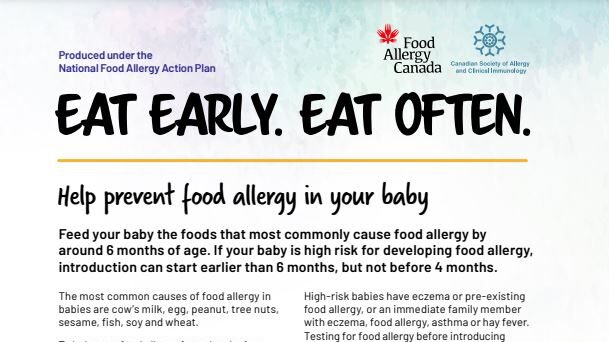Ask the allergist is a regular feature in our newsletters where Canadian allergists answer your questions!
Please note: The allergists featured in this series answer questions on general topics, please talk to your doctor if you have questions about your own health or the health of your child.
This month, we asked Dr. Julia Upton questions about the early introduction of allergens for the prevention of food allergy.
I’ve introduced allergens early and my baby did not react. Can I check early introduction off my list?

Congratulations for taking the first step and introducing a wide variety of foods. We are encouraging “eat it early, eat it often” to give the lowest risk of allergy.
In Canada, foods like peanut are in our house dust so we are exposed to it through the skin in tiny amounts. Even if not eating it, our bodies are still being exposed to the food. If the immune system only sees the food on the skin, it can make a mistake and think the food looks like a threat that needs to be fought. This most likely occurs in the first few years of life, although we are still learning about the causes of the onset of food allergy at later ages.
The best way to reduce the chances of the immune system making a mistake is to eat foods early and often. This routine ingestion exposes the gut to the food protein and sends a message to the immune system that these proteins are indeed foods and not a threat.
Once my baby has eaten the food and there’s no reaction, how long does it need to be kept in their diet to maintain tolerance?

We do not for sure know the exact amount of food required, or how many times a week, or for how many years it is required to eat a food to minimize the chance of allergy. We do know from a major study (LEAP and LEAP-ON) that early introduction and regular ingestion of age-appropriate peanut products until the age of five years is protective against peanut allergy. After age five, even those who avoided peanut for a year continued to tolerate peanut.
From these studies the recommendation is to eat it early, eat it often, defined as age-appropriate serving sizes a few times a week.
Although the LEAP studies focused on peanut, we can apply the same learning to other allergenic foods, such as milk, egg, wheat, sesame, tree nut, soy, etc.
Learn more
 Eat Early. Eat Often.
Eat Early. Eat Often.This must-have parent resource gives guidance on how to feed babies early, what to watch for in terms of an allergic reaction, recipes, and tips!
 Early introduction
Early introductionVisit our early introduction section to access webinars, resources, and more on early introduction guidance.

Dr. Julia Upton is on staff at the Hospital for Sick Children in the Immunology and Allergy Department; and an Associate Professor in the Department of Paediatrics at the University of Toronto. She is on the Board of Directors of the Canadian Society of Allergy and Clinical Immunology, and is a member of our Healthcare Advisory Board.
Please note: Dr. Upton is answering as an individual allergist and her answers do not constitute an official position of her affiliated organizations. Her responses are for informational purposes only and do not constitute specific medical advice, recommendations, diagnosis, or treatment. Please talk to your doctor about any concerns or questions you may have regarding your own health or the health of your child.
Do you have a food allergy-related question you’d like to ask an allergist? If so, send it along to us at info@foodallergycanada.ca.
Tags: ask the allergist, early introduction